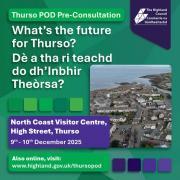Highland Council To Implement Trauma Informed Practice
1st July 2022
At the first full Highland Council Committee meeting (30 June 2022), newly elected Members agreed that the Council will implement a trauma informed practice across all Council services.
It is estimated that around 60% of the UK population has experienced psychological trauma in their lifetime. For more vulnerable groups, including people in in-patient mental health, drug and alcohol services and the justice system, the prevalence is even higher. The 2019 Scottish Health Survey (external link) found that just over one in seven adults reported experiencing four or more adverse childhood experiences (ACEs).
Health, Social Care and Wellbeing Committee Chair, Cllr David Fraser said: "The Highland Council shares the ambitions of the Scottish Government and COSLA to develop a trauma informed workforce across Highland. The aim is to ensure we deliver services in ways which prevent further harm or re-traumatisation for those who have experienced trauma or adversity at any stage in their lives. Part of this will be identifying champions to help promote, oversee, and embed trauma informed systems and services across all parts of the organisation.
"While living through trauma is relatively common, the experience and its impact is often hidden. Although many people show remarkable resilience, it remains a fact that people who experience trauma are at higher risk of experiencing poorer outcomes at all stages of their lives, across physical and mental health, education, employment and wellbeing, if they do not have access to the right support at the right time, if needed. There is growing evidence that, where the impact of trauma on those affected is understood by staff, and systems are adapted accordingly, this can result in better outcomes for people affected by trauma. This is the reason why, as both an employer and public facing service, embedding trauma informed staff across all Council services is of vital importance."
Leader of the Council, Raymond Bremner said: "Responding to trauma is, now more than ever, a public health priority and a priority for the Council. COVID-19 and the restrictions put in place to contain the virus have significantly increased the risk of people experiencing trauma and re-traumatisation. This includes people living with domestic abuse or child abuse, facing poverty, financial hardship or unemployment, those facing severe/chronic illness, affected by suicide or sudden bereavement."
The implementation of the national trauma training programme provides information to support organisations, managers and workers to identify knowledge and skills requirements; training providers to develop evidence-based learning; and people affected by trauma to understand the support that they can receive. The national training plan sets out key principles and considerations for developing a trauma-informed workforce. The plan advises that in order for training to be successfully translated into practice, three areas must be considered:
Developing a competent workforce.
Ensuring organisational support for new skills and new ways of working.
Providing effective leadership to support embedding new skills.
By being trauma informed, the Council aims to improve service delivery by being more aware of potential barriers for those trying to access services and recognise the role in responding to this. Internally, trained trauma staff will support the wellbeing of colleagues by working in a trauma informed way.
The report can be read here -
https://www.highland.gov.uk/download/meetings/id/80170/8_embedding_trauma_informed_practice_in_highland_council
Related Businesses
Related Articles
Exciting Career Opportunities With The Highland Council Now Open For Applications
# 10 December 2025 Career opportunities with The Highland Council The Highland Council is looking to fill a variety of posts relating to civil engineering and flood risk management based in locations across the area. Included are opportunities specifically for civil engineering graduates and technicians, providing the ideal job with career progression for anyone recently qualified and ready for a varied and interesting role.
What the NC500 Research Projects Are Designed to Do - and Why They Matter for the Highlands
As the North Coast 500 approaches its tenth anniversary, it has become one of Scotland's most well-known tourism success stories. The 516-mile loop around the far north of the Highlands has been celebrated internationally, marketed as a world-class road trip, and credited with transforming visitor numbers in some of Scotland’s most remote areas.Help Shape the Future of Thurso
The Highland Council is inviting people that live, work, or study in Thurso, to come along to the public consultation events to have their say. This is an opportunity to help shape the future of Thurso, to gather views and ideas.
Are Scottish Councils Quietly Reversing Outsourcing? A Look at Insourcing, Cuts and the Highland IT Shift
A notable article in the Guardian on 6 December 2025 noted the high sums being paid by London councils outsourcing services to private firms. The article starts with the reduction in council funding by UK government since 2010.Council welcomes Visitor Levy flexibility plan
The Highland Council welcomes moves by the Scottish Government to introduce greater flexibility on how it could design a Visitor Levy Scheme for consultation. The Visitor Levy (Scotland) Act 2024 currently provides local authorities with discretionary powers to implement percentage-based levies following statutory consultation.Highland Council is reaching out for views to shape its next 26/27 budget.
As it looks to set out its forthcoming priorities, the council is seeking involvement from members of the public, including businesses, community groups, parents, and young people. All their opinions are going to be crucial in deciding how Highland Council will take on its budget challenge for 2026-2027.Have your say in Thurso's future £100million investment by attending public consultation events
Thurso is to benefit from £100m investment in education and community facilities and are rolling out the first phase of public consultations on 9 and 10 December 2025. The Highland Council is inviting people that live, work, or study in Thurso, to come along to the public consultation events to have their say; this is an opportunity to help shape the future of Thurso, to gather views and ideas.Finding new owners for empty homes - Scheme launched to help return more empty homes to active use
A new online portal has been launched to bring empty homeowners together with prospective buyers or developers with the aim of facilitating more properties to be used as homes again. Covering the whole of Scotland, this builds on the success of local pilots, referred to as "matchmaker schemes".Consideration for short term let control area in Skye and Raasay
Steps towards introducing a short term let control area have been considered by Highland Council's Isle of Skye and Raasay area committee. On Monday (1 December 2025) the committee heard evidence to justify the grounds for the introduction of a Short Term Let Control Area covering all or part of Skye and Raasay.Workforce North event spotlights Highland economy
EMPLOYERS and educators from across the Highlands have gathered to hear how a new initiative is aiming to transform the region's economy. Workforce North - A Call to Action brought together business leaders and teachers from primary and secondary schools from across the Highland Council area with a wide range of partners geared towards education, learning and skills development at Strathpeffer Pavillion.
